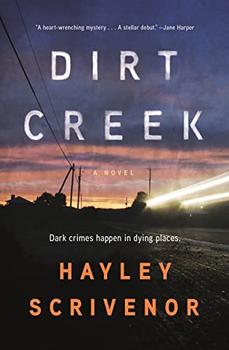Summary | Excerpt | Reviews | Beyond the Book | Readalikes | Genres & Themes | Author Bio

A Novel
by Hayley ScrivenorWE
TUESDAY, DECEMBER 4, 2001
We were waiting for things to converge.
It was still dark. Even if the sun had been up, we would not have needed to look around us. It was the same dirt, lazily punctuated here and there by dry grass, the same rust-ringed cement water trough close to the fence line, the same white cypress pines that dotted our own families' properties. A landscape as familiar to us as the backs of our own eyelids. And we knew we'd found the spot again by the smell. It pushed its way into our nose and throat like a rod of twisted tissue rammed so far it hurt. It was the smell of dead lambs left to rot in the sun.
The stitches in the man's arm tugged as he turned the steering wheel of his ute. From his vantage point in the driver's seat, the main house was just a smudge in the distance. The sun was coming up now. He was checking the fences after his time away from the farm. If he'd driven just a meter closer to the fence line—a meter was nothing on a property like his—he never would have found it. But the ute's cab tipped slightly as he drove over soft ground. The man stood in the space created by the open front door of the vehicle, and the smell hit him the same way it had hit us. He walked around the ute and plucked a shovel from the cargo bed. Us kids heard and saw it all. The man's labored breathing was interrupted only by the occasional shink of the shovel in soil. We watched his face as he winced in pain. We took note of the angle of his shoulders as the blade hit something that did not give, something that was not dirt or a root. We saw him crouch to scoop away earth with one hand, running his fingers along shiny black plastic. It was four days since anyone, including us, had seen Esther Bianchi.
The sun was properly up now. Sweat dripped into his eyes, trickled down his spine. We saw him blink. He stood back, used the shovel to sweep dirt from the edge of the hole. There were only five or six inches of earth on top of the package, which seemed to be much longer than it was wide. The plastic was slippery in his hands. .
* * *
Later, the police would admonish the man for moving the body. As soon as he suspected what he had found, he should have called someone.
"And what if it was just a calf or somethin', and I called you and you came for nothing?" the man would say, eyebrows pulled high into his forehead.
Why would a calf be wrapped in black plastic? the female detective would think but not say.
* * *
The man yanked the package with his good arm. The earth gave the parcel up, and he fell back, his leg bending awkwardly beneath him. He scrambled away, his stitches pulling, pain unfurling like a flower. He stood and looked toward the distant house before stepping forward. The man unwrapped the plastic, ignoring the pain in his arm, retching at the smell. When the parcel's contents came into view, the man turned away, hand held to his mouth.
What does it all mean? For now, we can only tell you that we were there, that we watched blood seep through the man's sleeve as he walked away from Esther Bianchi's body and looked around him, as if the answer might be found somewhere in the open field.
RONNIE
FRIDAY, NOVEMBER 30, 2001
Once, Esther tickled me so much that I wet myself. We were at her house, in her backyard.
"Stop, Esther!" I said, laughing through pain.
"No mercy!" she cried.
She was the villain when we played, the person who moved the story forward while I fussed over details. We were eight years old.
I'd fallen to the ground in a patch of dirt. Esther was on top of me. So many years ago now, but I remember the way the laughing-pain swelled as she dug her fingers into the soft dough of my belly. It went on and on, like when you jump in the deep end of the pool and you're waiting, waiting to reach the bottom so you can use it to push up to the surface. I looked down, saw the wetness spreading across my sports shorts before I felt it. Esther saw it, too. I shuffled away from her on my bum. I was too big to be weeing my pants.
Excerpted from Dirt Creek by Hayley Scrivenor. Copyright © 2022 by Hayley Scrivenor. Excerpted by permission of Flatiron Books. All rights reserved. No part of this excerpt may be reproduced or reprinted without permission in writing from the publisher.
Heaven has no rage like love to hatred turned, Nor hell a fury like a woman scorned.
Click Here to find out who said this, as well as discovering other famous literary quotes!
Your guide toexceptional books
BookBrowse seeks out and recommends the best in contemporary fiction and nonfiction—books that not only engage and entertain but also deepen our understanding of ourselves and the world around us.